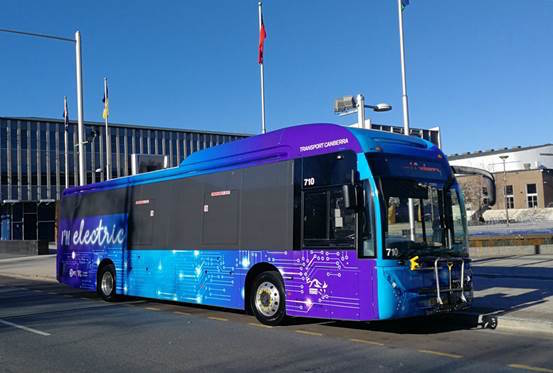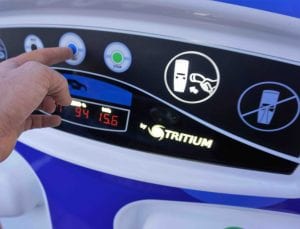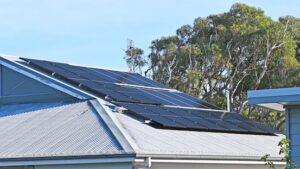The inconsistency and hypocrisy of state clean energy plans was on full display this month when Premier Daniel Andrews toured the former Ford factory in Geelong to open a wind turbine assembly plant.
Not so long ago, his Minister for Public Transport Melissa Horne was touring another factory, automotive body builder Volgren, inspecting dirty diesel-powered buses the government is proposing to buy – ignoring the coaches powered by electricity that the Dandenong plant is also manufacturing.
Andrews told the assembled media in Geelong that he was championing the activism of Australian children taking time out from school to protest inaction on climate change pollution. But if Andrews truly believes this, then why has his government signed off on a fleet of 100 new buses that will spew lung-busting particulates into the air?
(Ed: Victoria is not the only state doing this. West Australia recently signed a contract for 900 diesel buses, despite competing offers for electric once).
Combusting diesel to power buses produces fine pollution particles known as PM10 and PM2.5. They are small enough to penetrate the thoracic tissues of the respiratory system and lead to lung disease, especially among children.
A 2013 World Health Organisation report explained: “Exposure to PM affects lung development in children … as well as chronically reduced lung growth rate and a deficit in long-term lung function.”
Meanwhile, the sale of electric buses globally jumped 32 per cent last year, according to Bloomberg research.
Most of them are on China’s roads. But other countries, such as India, Germany and the US, are also jumping onto the electricity-powered bus bandwagon and Victoria has missed an important opportunity to join them.
Shenzhen-based vehicle maker Build Your Dreams (BYD) received around $1 billion in subsidies toward its electric bus program in 2016. The company is backed by forward-thinking investor Warren Buffett’s Berkshire Hathaway.
Electric buses may be more expensive to buy than fossil-fuel powered ones, although the gap is narrowing quickly, but they save hundreds of thousands of dollars in diesel costs per bus a year and are easier to maintain.
And they do not create pollution from their exhaust pipes. Which is why China – alarmed at the rising number of premature deaths caused by carcinogenic pollution – has rolled out more than 500,000 BYD buses.
In the world’s biggest asthma capital, Melbourne, you would think the Victorian Government might realise it could save millions of dollars in medical costs by investing in healthy electric public road transport. It would be a win-win for the state budget and the well-being of children walking or riding their bicycles to school.
Australian governments should ban any new purchases of diesel buses, just as it bans under-age cigarette smoking. Incentives and subsidies should be provided to Volgren and the several other local bus assembly plants to fast-track production of electric buses and help bring down their pricing.
A conventional bus costs between $500,000 and $800,000. Electric buses are just a tad more expensive at between $700,000 and $800,000 and costs are coming down as battery technology keeps on improving.
Further, buses can be hybridised with solar panels to add to their kilometre range at both bus stops and stations as well as on their cabin rooftops.
Volgren’s prototype has been built on a BYD chassis and includes 324 kWh of batteries, enabling a range of more than 250km on a single charge.
The depleted batteries take between four and five hours to fully replenish.
Ongoing research and development around the world is bringing electric charging times down with every new product launch and innovative charging at stops and stations is extending the daily range beyond 250km.
BYD is understood to be installing a ground-breaking, wireless vehicle charging network in a venture with Philadelphia-based Momentum Dynamics and Indianapolis’ own public transport system, Indygo.
Three high-powered, wireless inductors will be installed to deliver 300kW charging to a fleet of 33 buses, allowing 24-hour-a-day, seven-day-a-week operation.
The Chinese company is not the only player that sees a big future for electric buses. Others include CRRC, Alexander Dennis Limited, Solaris Bus & Coach, Zhengzhou Yutong, New Flyer, Volvo and Proterra.
Buffett’s own sources estimate that the electric bus market is expected to be worth $72.9 billion in the next five years, with a growth rate of 19.6 per cent between now and 2024.
Back in Spring St, Victorian parliamentarians ought to be worried about the growth rate of lung diseases attributed to their dirty diesel buses. When more people are going to die from the busses you purchase than get carried by them then we know there’s something seriously out of whack with the governments thinking.
Matthew Wright is executive director of Pure-Electric.










